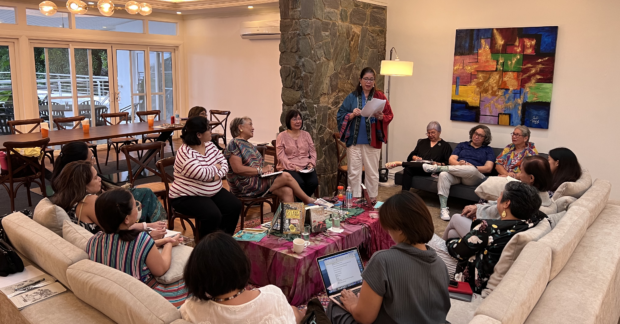
When the sky drenched parts of the metro in a sudden—but brief—downpour on Thursday afternoon, it felt like a tease. Dennis Lustico’s 25th anniversary show at the Goldenberg Mansion was originally set to usher in the holidays during the first week of September. Instead, it had to be pushed back by a month due to a raging typhoon.

The cloudburst on Thursday was gone almost as soon as it came. And by the time the show began later that evening, the ground was dry again.
Showers like these are par for the course in the Philippines. The rain waters the earth and helps grow the plants and trees that inspired much of the 50-piece collection. Titled “Pamana,” which means “heritage” or “legacy,” the show creatively featured leaves from various local vegetation as enchanting embroideries, elegant embellishments or playful patterns.
Homage to artisans
With locally woven fabrics as a guiding element, Lustico called on weavers from Aklan to create new patterns on piña fabric based on foliage that constantly surrounds the renowned couturier, like anahaw and squash. Who knew malunggay fronds could make such a charming detail?
His designs were similarly rooted in other icons of Philippine heritage like the wood carvings of Pampanga, the stone houses of Batanes and excavated jewelry translated into beautifully intricate beadwork.
“The inspiration came from the very essence of our country’s art, that everything is done with passion by the masterful hands of Filipinos who live mostly in the countryside. Every product or piece of art is influenced by the abundant and beautiful nature of our archipelago,” said Lustico.
“Pamana,” he explained, is a tribute to Philippine arts and crafts—an homage to generations of artisans, particularly weavers, embroiderers and wood and metal workers.
Subtle touches
Where others impress with demonstrations of either excess or sparsity, Lustico’s works shine in their refreshing just-rightness as he gracefully traipses the lines of beauty, artistry and taste.
That is not to say he lacks ingenuity. On the contrary, he displays it in the most subtle ways: by retaining the gauzy backing of embroidery to cleverly manufacture pattern, texture and movement; by the secret way separates are connected by a chain in the beadwork; by creating fringe right on the fabric to produce an enchanting, feather-like effect. (Again, who knew tastas could be so lovely?)
Marked by his artful fusion of hues, textures, materials and techniques, the designer’s mastery of romance in both women’s and men’s clothing as seen in his contemporary concepts infused with the richness of history in “Pamana” tells the story of his “continuing journey as a clothing and fashion designer, having learned from the lessons of the masters and inspired by the artisans of local crafts.”
“It is both looking back and preparing for the future,” he said, describing the milestone as a mere pit stop. “It is a culmination of 25 years of a design journey, and the start of continuing lessons for the years to follow.” INQ




















































